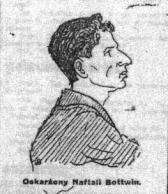Naftali Botwin
Izaak Naftali Botwin, (Yiddish: יצחק נפתלי באָטווין) born 19 February 1905 in Kamianka-Buzka, Austrian Empire, died 6 August 1925 in Lwów, Poland, was a Polish communist and labour activist who was executed for the murder of a police informant. In the Spanish Civil War the Naftali Botwin Company was named after Botwin.

Early life
Botwin was born as the eighth child of a poor Jewish family in Kamianka-Buzka, modern-day Ukraine. His father died early, so Botwin was sent to work in a factory at the age of 13.[1] Two years later, he became an apprentice to a shoemaker, and worked as a leather cutter in a shoe shop, until he was sacked in April 1925, for political activism. In 1922 Botwin joined the Tsukunft, the youth organization of the General Jewish Labor Bund of the Russian Empire. A year later he joined the labour union and became a member of the Communist Youth Union of Western Ukraine and in 1925 a member of the Communist Party of Western Ukraine, which were active in eastern interbellum Poland.[2]
Shooting of Josef Cechnowski
On 29 July 1925 Botwin shot dead Josef Cechnowski in Lviv.[3] Cechnowski was an agent of the Polish[4] secret police Defensywa. He had infiltrated the Communist Party in Warsaw, and worked as an informer. In 1925, the communists discovered his double role and resolved to kill him. One assassination plot in Warsaw was exposed, and three communist party members were arrested and subsequently executed, after which Cechnowski moved to Lviv, where he believed there was less risk that he would be recognized.[5] Botwin was arrested at the crime scene with no resistance. His trial was short as Botwin plead guilty and accepted all the consequences. The verdict was announced a day later, and he was sentenced to death by the drumhead court in Lviv.[6] Botwin's defense made a petition for the presidential pardon but it was rejected by the president Stanisław Wojciechowski. Naftali Botwin was executed by a firing squad on 6 August 1925 at the Brygidki prison in Lviv. Botwin did not want his eyes to be covered. In his last words Botwin exclaimed: ″Down with bourgeoisie! Long live the social revolution!″ He was buried at the Yaniv cemetery in Lviv.[2]
In the years after his death, Botwin's legacy continued, especially in Jewish communist circles in Poland. He was the subject of several Yiddish plays, children were named after him and the day of his death was part of the Yiddish Communist calendar.[7]
Naftali Botwin Company
In December 1937 the Jewish volunteers of the Spanish Civil War formed the Naftali Botwin Company.[8] It was a sub-unit of the Palafox Battalion of the International Brigades and of Jews who had completed the short training course but had not yet been placed in a combat force.[9] The company also published a Yiddish newspaper called Botwin.[10][11] 150 Jews from Poland, France, Belgium and the Yishuv region served in the Botwin Company. Among them were two Palestinian Arabs, one of whom spoke Yiddish. The members of the unit spoke Polish, Spanish and Ladino. They designed a flag with the writing "The Naftali Botwin Company", the name of their brigade "Palafox Brigade" and the motto "For our Freedom and your Freedom" in Spanish, Polish and Yiddish on it.[9][12]
References
- Shmidt, O.Yu. (chief editor), Bukharin N.I. et al (eds) (1927). Большая советская энйклопедия volume 7. Moscow. p. 249.CS1 maint: extra text: authors list (link)
- Melamed, Vladimir: "Steiger Affair and Ukrainian-Jewish Relations in Eastern Galicia in the 1920s" Jewish Lviv, #51/2008. Retrieved 14 January 2015.
- Security, United States Congress House Committee on Internal (1973). The Theory and Practice of Communism: Hearings, Ninety-third Congress, First Session. U.S. Government Printing Office.
- Trepper, Léopold (1995). Die Wahrheit: Autobiographie des "Grand Chef" der Roten Kapelle (in German). Ahriman-Verlag GmbH. ISBN 978-3-89484-554-4.
- "Львовский коммунист Нафтали Ботвин (Lviv communist Naftali Botvin)". LiveJournal. Retrieved 2 October 2019.
- "Warmbrunner Nachrichten. Unparteiische Tageszeitung für das Riesengebirge" (PDF). bibliotekacyfrowa.pl. 9 August 1925. Retrieved 6 November 2019.
- Zaagsma, Gerben (2017-04-06). Jewish Volunteers, the International Brigades and the Spanish Civil War. Bloomsbury Publishing. ISBN 978-1-4725-1379-3.
- "Die Häftlinge des KZ Außenlagers Hailfingen/Tailfingen" (PDF). alemannia-judaica.de. Retrieved 2 December 2019.
- Friling, Tuvia (2014-07-01). A Jewish Kapo in Auschwitz: History, Memory, and the Politics of Survival. Brandeis University Press. ISBN 978-1-61168-587-9.
- The Naftali Botwin Company Jews in the Spanish Civil War. Retrieved 14 January 2015.
- "1937: Jewish Force Formed to Fight Fascism in Spanish Civil War". Haaretz. 2016-12-12. Retrieved 2019-12-02.
- Herreros, Sebastià (March 2003). "The International Brigades in the Spanish war 1936-1939: Flags and Symbols" (PDF). flaginstitute.org. Retrieved 5 December 2019.